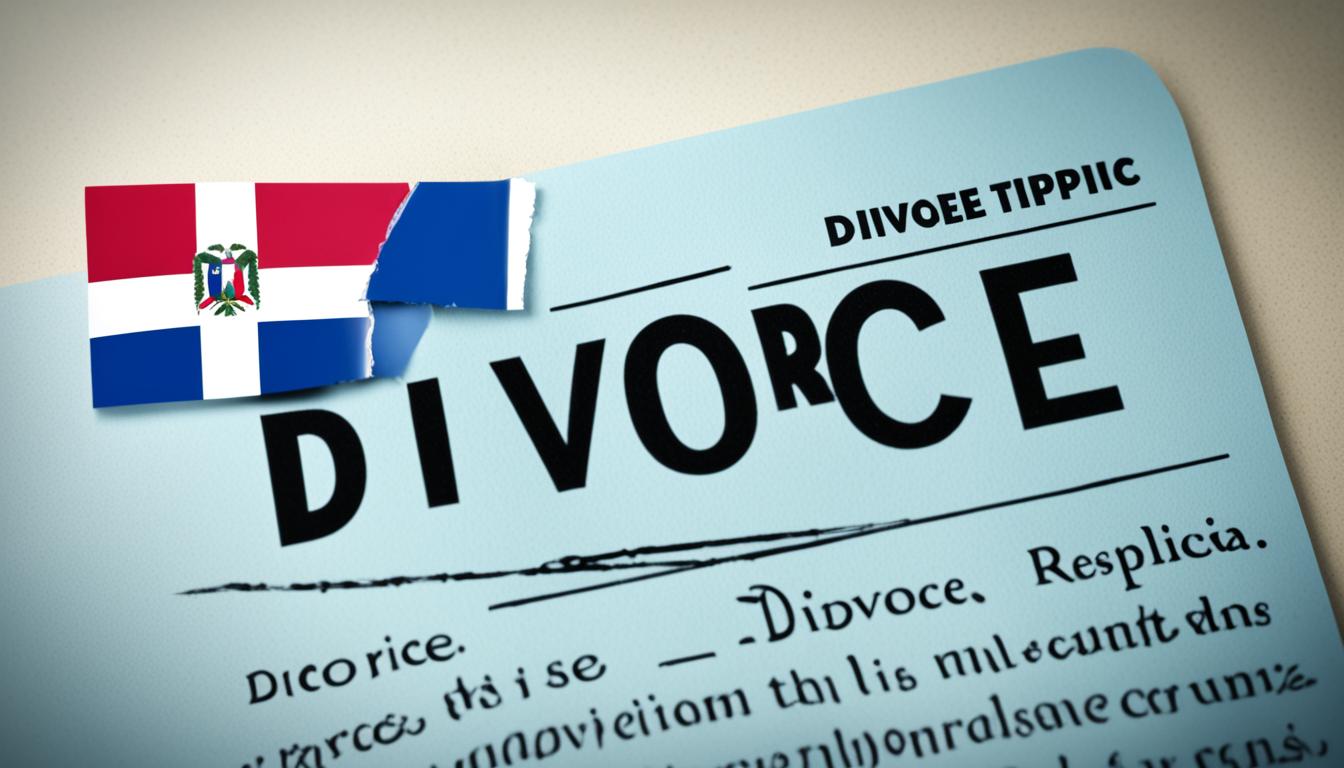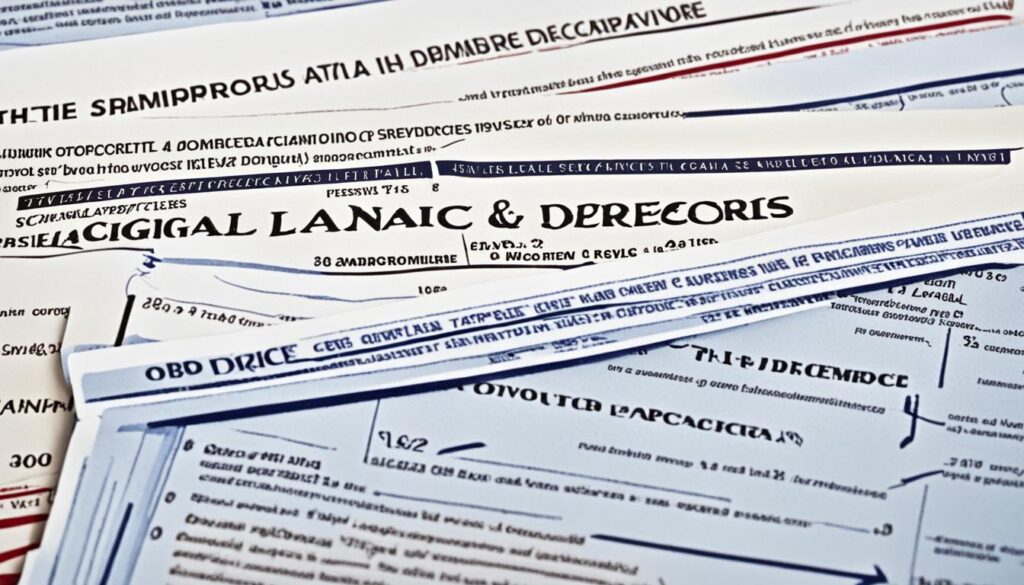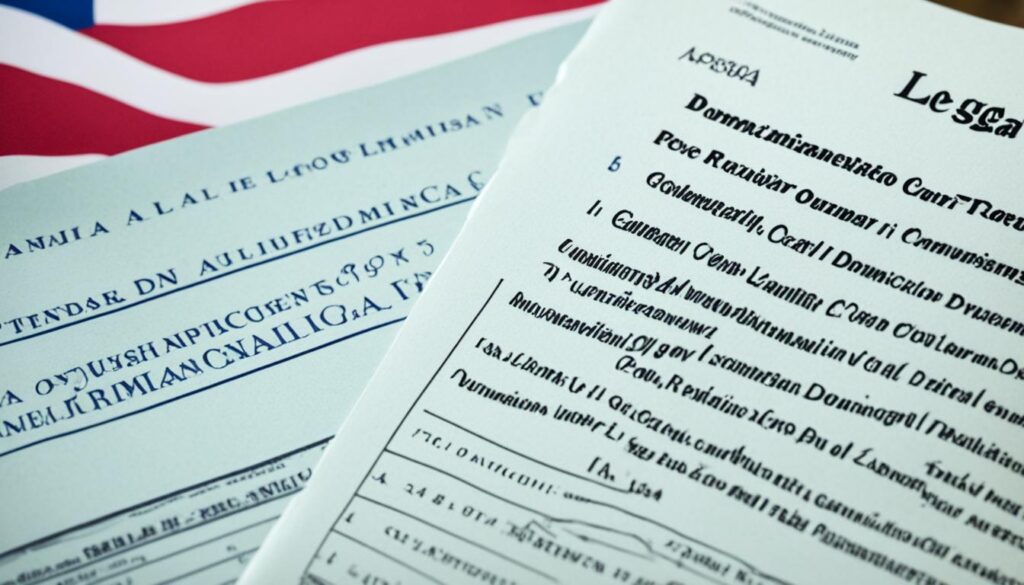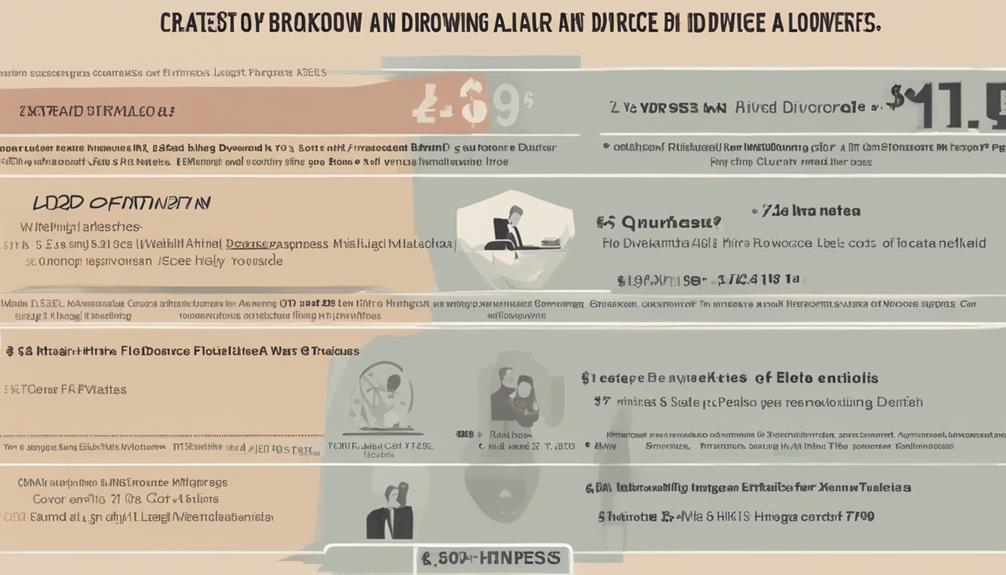Navigating the Divorce Process
Understanding Dominican Republic Divorce Law

Were you aware that a significant number of United States citizens opt to finalize their divorces in the Dominican Republic? Indeed, this Caribbean nation has risen in popularity for those seeking to dissolve their marriages, thanks to its comparatively simple procedures and adaptable nature. Nonetheless, it’s crucial for people to recognize the critical legal restrictions in place prior to proceeding with a divorce in the Dominican Republic.
In this article, we will explore the ins and outs of Dominican Republic divorce law, including the separation process, legal restrictions, and the recognition of divorces obtained abroad. Whether you are considering a divorce or simply curious about this unique aspect of international law, read on to gain a comprehensive understanding of Dominican Republic divorce law.
Key Takeaways:
- Dominican Republic is a popular destination for U.S. citizens seeking a divorce due to its straightforward process.
- Legal restrictions may apply to divorces obtained abroad, so it is important to consult with a local attorney.
- There are two types of divorces available in the Dominican Republic: divorce by mutual consent and divorce for cause.
- The process of obtaining a Dominican divorce decree involves specific steps and document requirements.
- The recognition of Dominican divorces by other governments, including the United States, can vary depending on local laws and regulations.
Types of Divorce in the Dominican Republic
In the Dominican Republic, foreigners have the option to choose between two types of divorces: divorce by mutual consent and divorce for cause.
Divorce by mutual consent allows the demanding party to dissolve the marriage without the need to prove a specific cause. However, both parties must demonstrate their mutual agreement to end the marriage. Importantly, residency is not a requirement for this type of divorce. However, at least one party must appear at the hearing.
On the other hand, divorce for cause is based on specific grounds such as incompatibility of character or adultery. To proceed with a divorce for cause, the plaintiff or their legal representative must personally appear before the court. The judge holds broad powers in a divorce for cause, which includes determining the division of marital properties and support payments.
In summary:
- Divorce by mutual consent: No need to prove a specific cause, but mutual agreement required. Residency not required, but one party must appear at the hearing.
- Divorce for cause: Based on specific grounds like incompatibility of character or adultery. Plaintiff or legal representative must appear personally. Judge determines property division and alimony.
Understanding the different types of divorce available in the Dominican Republic is crucial for individuals seeking to dissolve their marriage in the country.
Obtaining a Dominican Divorce Decree
To obtain a Dominican divorce decree, one of the spouses must appear in person in court in Santo Domingo, while the absent spouse can authorize an attorney to appear on their behalf. The process typically takes about an hour and requires certain documents, including the original or certified copy of the marriage certificate, a special power of attorney executed by the non-appearing spouse, and proof of identity. It is essential to follow the proper procedure and obtain a copy of the divorce decree for legal purposes.
The Dominican public registry offices operate differently from those in the U.S., and records can only be retrieved chronologically. Therefore, it is advisable to hire a lawyer or representative to obtain the extract on your behalf if you cannot be physically present in the Dominican Republic.

Procedure for Obtaining a Dominican Divorce Decree:
- One spouse must appear in court in Santo Domingo.
- The absent spouse can authorize an attorney to appear on their behalf.
- Required documents include:
- The original or certified copy of the marriage certificate.
- A special power of attorney executed by the non-appearing spouse.
- Proof of identity.
It is important to ensure that all necessary documents are prepared and presented during the divorce proceedings. By following the proper procedure and obtaining a copy of the divorce decree, individuals can ensure that their divorce is officially recognized and legally enforceable.
Recognition of Dominican Divorces by Other Governments
Dominican divorces are generally looked upon with disfavor in the United States. Recognition of a Dominican divorce by a foreign jurisdiction, including the United States, will depend on the laws of that jurisdiction. While some states may grant comity, others may not recognize a Dominican divorce. New York is one of the few states that recognize bilateral Dominican divorces, but specific conditions must be met, such as both parties participating in the divorce proceedings and one party physically appearing before the court in the Dominican Republic. It is crucial to consult a competent attorney to understand the recognition of a Dominican divorce in the desired jurisdiction.

When it comes to the recognition of Dominican divorces by other governments, there is a lack of uniformity. Each jurisdiction has its own laws and regulations governing the recognition of foreign divorces. While some jurisdictions may grant recognition to a Dominican divorce based on the principle of comity, others may require additional criteria to be met.
For example, in the United States, the recognition of a Dominican divorce varies from state to state. Some states may recognize a Dominican divorce as long as it was obtained in compliance with the laws of the Dominican Republic. However, other states may have more stringent requirements, such as requiring both parties to have been personally present during the divorce proceedings in the Dominican Republic.
New York is one state that recognizes bilateral Dominican divorces, but it has specific conditions that must be met for recognition. Both parties must have participated in the divorce proceedings, and one party must have physically appeared before the court in the Dominican Republic. Failure to meet these conditions may result in the non-recognition of the Dominican divorce in New York.
To navigate the complexities of the recognition of Dominican divorces by other governments, it is crucial to consult with a competent attorney who is familiar with the laws and requirements of the desired jurisdiction. An experienced attorney can provide expert guidance and assistance in ensuring that the Dominican divorce is recognized and enforced in the desired jurisdiction.
Examples of Recognition of Dominican Divorces
Below are some examples of how different jurisdictions approach the recognition of Dominican divorces:
| Jurisdiction | Recognition Criteria |
|---|---|
| New York | Both parties participated in the divorce proceedings, and one party physically appeared before the court in the Dominican Republic. |
| California | The divorce was obtained in compliance with the laws of the Dominican Republic. |
| Florida | Both parties were personally present during the divorce proceedings in the Dominican Republic. |
It is important to note that the table above is for illustration purposes only and should not be considered an exhaustive list of recognition criteria for every jurisdiction. The laws regarding the recognition of foreign divorces can vary significantly, and it is essential to consult with a competent attorney for specific guidance based on the desired jurisdiction.
Legal Options and Grounds for Divorce in the Dominican Republic
When it comes to divorce in the Dominican Republic, there are various legal options and grounds available. Whether it’s due to irreconcilable differences, adultery, abuse, abandonment, habitual drunkenness, or drug use, couples have the opportunity to file for divorce based on specific reasons. The court of first instance in the judicial district of either the respondent or plaintiff’s residence has the jurisdiction over divorce proceedings, ensuring a fair and accessible legal process.
To initiate a divorce, one must file a suit, serve summons to the respondent, and present evidence and witnesses to support their case. The process involves thorough examination, ensuring that all parties have the opportunity to present their side and defend their interests. Once the court reaches a judgment, it may also address important matters such as custody arrangements for any children involved in the divorce, aiming to protect their best interests and well-being.
“Divorce for cause in the Dominican Republic allows individuals to seek legal resolution when their marriage becomes untenable due to a variety of reasons. This ensures that those facing challenging circumstances have legal recourse and the ability to move forward towards a brighter future.”
Grounds for Divorce in the Dominican Republic:
- Irreconcilable differences
- Adultery
- Conviction of a spouse on a criminal charge
- Abuse or serious insults
- Voluntary abandonment of the home
- Habitual drunkenness or drug use
By providing these legal options, the Dominican Republic ensures that individuals who find themselves in difficult marital situations have the means to seek resolution and pursue a happier, more fulfilling life.

| Grounds for Divorce | Definition | Evidence Required |
|---|---|---|
| Irreconcilable Differences | When spouses can no longer resolve their conflicts | Statement from both parties |
| Adultery | When one spouse engages in a sexual relationship outside the marriage | Evidence of infidelity |
| Conviction of Spouse on Criminal Charge | When one spouse is convicted of a criminal offense | Official records of conviction |
| Abuse or Serious Insults | When one spouse subjects the other to physical or emotional harm | Evidence of abuse or witnesses |
| Voluntary Abandonment of the Home | When one spouse willingly leaves the marital home without justification | Proof of abandonment |
| Habitual Drunkenness or Drug Use | When one spouse regularly abuses alcohol or drugs, creating an unstable home environment | Evidence of substance abuse |
It is important to consult with a qualified attorney to understand the specific legal requirements and gather the necessary evidence to support your case. With the right guidance, individuals can navigate the divorce process with confidence and seek a fresh start.
Divorce Proceedings for Cause in the Dominican Republic
Divorce proceedings in the Dominican Republic involve several important steps and procedures to ensure a fair resolution. Understanding the process is crucial for a smooth and successful divorce. Here’s what you need to know:
The Suit and Summons
When filing for divorce for cause in the Dominican Republic, the plaintiff begins by filing a suit with the court. This suit outlines the reasons for the divorce and states the desired outcome. After filing the suit, the plaintiff must serve a summons to the respondent, formally notifying them of the divorce proceedings and giving them a chance to respond.
Statements and Observations
During divorce proceedings, both the plaintiff and the respondent have the opportunity to present their statements and observations to the court. The plaintiff will present their reasons for seeking the divorce, submit relevant documents as evidence, and may call witnesses to support their case. The respondent then has the chance to respond, present their own evidence and witnesses, and make their own observations about the divorce.
The divorce proceedings in the Dominican Republic follow a comprehensive process, allowing both parties to present their side and provide evidence. This ensures fairness and gives everyone involved an opportunity to be heard.” – Dominican Divorce Attorney
Court Record and Judgment
Throughout the divorce proceedings, the court clerk records all the statements, objections, evidence, and observations, creating a detailed court record. Once both parties have presented their cases, the court will render a judgment based on the evidence and arguments presented. The judgment will determine the outcome of the divorce, including issues such as the division of assets and child custody arrangements.
Appeals
After the judgment is rendered, either party has the right to appeal the decision within a specific timeframe. An appeal allows the case to be reviewed by a higher court and potentially reconsidered. It is important to note that the grounds for appeal are typically limited to errors in the application of the law or procedures rather than a reassessment of the evidence or arguments already presented.
Overall, divorce proceedings for cause in the Dominican Republic follow a structured process to ensure fairness and protect the rights of both parties involved. It is crucial to follow the proper procedures, have legal representation, and present a strong case to achieve a favorable outcome.

Custody and Support in Dominican Republic Divorce
In a Dominican Republic divorce, the issue of custody of children holds significant importance. When both parties agree on custody arrangements, the court generally respects their agreement. However, in cases where no agreement is reached, the court will determine custody based on the best interests of the children involved.
Typically, children under four years of age remain with their mother, whereas older children may be placed with the spouse granted the divorce or even with another party if it is deemed to be in the children’s best interest.
It is important to note that both parents have an ongoing responsibility to provide support and contribute to the education of their children. The court will consider the financial resources of both parents when determining the amount of support payments required.
Whether custody and support arrangements are determined through mutual agreement or court determination, the primary objective is to prioritize the well-being and best interests of the children involved.
Important points:
- Agreement between parties on custody is generally respected by the court.
- If no agreement is reached, custody is determined based on the best interests of the children.
- Children under four years of age usually remain with their mother, while older children may be placed with the spouse granted the divorce or another party if in their best interest.
- Both parents have a responsibility to support and contribute financially to the education of their children.
Requirements for Dominican Divorce
Obtaining a divorce in the Dominican Republic requires specific documents to ensure a smooth process. These documents must be presented during the divorce proceedings and when transcribing the divorce judgment with the City Clerk.
Required Documents
- Original or certified copy of the marriage certificate
- Birth certificates of children
- Passports or proof of citizenship
- Plane ticket for entry and departure from the Dominican Republic
Preparing and gathering these necessary documents beforehand is crucial to avoid delays and complications during the divorce process.
If you are unsure about any of the required documents or need assistance in obtaining them, it is advisable to consult with a local attorney familiar with Dominican divorce law. They can guide you through the process and ensure that you have all the necessary documentation in order.

| Required Documents | Description |
|---|---|
| Marriage Certificate | The original or certified copy of the marriage certificate is required to prove the existence of the marriage. |
| Birth Certificates | Birth certificates of any children from the marriage must be provided as proof and to establish custody arrangements. |
| Passports or Proof of Citizenship | Valid passports or other official documents proving citizenship for both parties are necessary for identification and legal purposes. |
| Plane Ticket | A plane ticket for entry and departure from the Dominican Republic is required to show proof of travel plans during the divorce process. |
Historical Context of Dominican Divorce Law
The history of Dominican divorce law provides valuable insight into the current legal framework. In 1971, the Dominican Republic enacted significant changes to its divorce laws, primarily motivated by the decline in Mexico’s popularity as a destination for quick divorces. This reform aimed to attract the migratory divorce trade, making it easier for foreigners to dissolve their marriages in the Dominican Republic.
By liberalizing its divorce laws, the Dominican Republic created a more accessible pathway for individuals seeking divorce. This historical context is crucial for understanding the nuances and implications of divorce law in the country today.
Understanding the historical context of Dominican divorce law is essential when considering divorce proceedings in the country. It allows individuals to navigate the intricacies of the legal system and make informed decisions that align with their needs and circumstances.
Obtaining Legal Assistance for Dominican Divorce
Due to the complexity of Dominican divorce law and the potential legal restrictions in the U.S., it is advisable to consult with a local attorney in the Dominican Republic. A local attorney can provide guidance, advice, and legal representation throughout the divorce process. They can help navigate through the legal requirements, ensure compliance with procedures, and protect the individual’s rights and interests. Hiring a reputable and experienced attorney is essential for a successful divorce in the Dominican Republic.
When seeking legal assistance for a Dominican divorce, consider the following benefits:
- Expertise in Dominican Divorce Law: A local attorney specializing in Dominican divorce law will have in-depth knowledge of the legal system and the specific requirements for obtaining a divorce in the country.
- Proper Documentation: An attorney can assist in gathering and preparing all the necessary documents required for the divorce proceedings, ensuring that nothing is overlooked or improperly submitted.
- Compliance with Procedures: Divorce procedures in the Dominican Republic can be complex and require strict adherence to specific steps. A local attorney will guide you through the process, ensuring you meet all the necessary deadlines and fulfill the required obligations.
- Protection of Rights and Interests: With a legal representative by your side, your rights and interests will be safeguarded throughout the divorce proceedings. An attorney will advocate for your best interests and work to secure a favorable outcome.
- Negotiations and Mediation: In cases where disputes arise during the divorce process, an attorney can assist in negotiations and mediation to reach a fair and amicable resolution.
Choosing the right attorney is crucial for the success of your Dominican divorce. Consider the attorney’s experience, reputation, and track record in handling divorce cases. Take the time to schedule consultations and discuss your specific needs and expectations. Remember, hiring a local attorney will give you access to their expertise in Dominican divorce law and increase your chances of a smooth and successful divorce.
Factors to Consider When Hiring a Local Attorney
| Factors | Description |
|---|---|
| Experience | An attorney with substantial experience in Dominican divorce law will be well-equipped to handle your case efficiently. |
| Reputation | Consider the attorney’s reputation within the legal community and among their previous clients. |
| Track Record | Review the attorney’s track record in handling divorce cases and their success rate in achieving favorable outcomes. |
| Communication Skills | Effective communication is essential when working with an attorney. Ensure that your attorney is responsive and able to explain complex legal matters in a clear and understandable manner. |
| Availability | Consider the attorney’s availability and workload to ensure they can dedicate sufficient time and attention to your case. |
By hiring a reputable local attorney, you can navigate the complexities of Dominican divorce law with confidence and increase your chances of a successful resolution to your divorce proceedings.
Considerations for U.S. Citizens Seeking a Dominican Divorce
U.S. citizens who are considering obtaining a divorce in the Dominican Republic need to be aware of the legal considerations involved. While some U.S. states may recognize Dominican divorces, others may have specific criteria or procedures for recognizing divorces obtained abroad. It is crucial to consult with an attorney in the individual’s state of residence to determine whether the courts will recognize a Dominican divorce as valid.
A state attorney can provide valuable guidance on the specific requirements and implications of obtaining a Dominican divorce. They will help navigate any legal restrictions and ensure that all necessary steps are taken to meet the criteria for recognition by U.S. courts.
Legal considerations for U.S. citizens, Recognition by U.S. courts, Consultation with state attorney
When seeking a Dominican divorce, consulting with a state attorney is the best course of action to protect your legal rights and interests throughout the process. They can provide the necessary expertise to help ensure a smooth and valid divorce.
Conclusion
In summary, Dominican Republic divorce law provides options for couples seeking to end their marriage. Whether through a divorce by mutual consent or a divorce for cause, the process involves filing a suit, presenting evidence and witnesses, and ultimately reaching a judgment. However, it is important to note that the recognition of a Dominican divorce by other governments, such as the United States, depends on the laws of the specific jurisdiction.
If you are considering a Dominican divorce, it is crucial to consult with a local attorney who can guide you through the procedures and inform you of any legal restrictions that may apply. Understanding the requirements and potential implications of a Dominican divorce is essential for a successful outcome. By seeking legal assistance and ensuring compliance with the necessary procedures, you can navigate the process with confidence.
Remember, divorce is a significant life event, and it is important to approach it with careful consideration and expert guidance. By staying informed and obtaining the necessary legal support, you can navigate the complexities of Dominican Republic divorce law and make decisions that are in your best interest.
To obtain a divorce in the Dominican Republic, certain steps must be followed, including filing the judgment in the Office of the Civil Registry and receiving a pronouncement. It is advisable to consult with a local attorney for guidance and legal representation. In the Dominican Republic, there are two types of divorces available: divorce by mutual consent and divorce for cause. Divorce by mutual consent does not require proving a specific cause and doesn’t require residency. Divorce for cause is based on specific grounds, such as adultery or incompatibility of character, and requires the personal appearance of the plaintiff or their legal representative.
To obtain a Dominican divorce decree, certain documents must be presented, such as the original or certified copy of the marriage certificate, a special power of attorney executed by the non-appearing spouse, and proof of identity. It is important to gather and prepare all the necessary documentation.
Recognition of a Dominican divorce by other governments, including the United States, will depend on the laws of that jurisdiction. While some states may recognize Dominican divorces, others may have specific requirements or criteria for recognition. It is important to consult with an attorney in the individual’s state of residence for guidance.
Divorces for cause in the Dominican Republic can be filed based on various grounds, including mutual consent, irreconcilable differences, adultery, conviction of a spouse on a criminal charge, abuse or serious insults, voluntary abandonment of the home, and habitual drunkenness or drug use.
Divorce proceedings for cause involve filing a suit, serving a summons to the respondent, presenting evidence and witnesses, and reaching a judgment. The judgment can be appealed within a specific timeframe. It is important to follow the proper procedures and have legal representation during divorce proceedings. Custody of children in Dominican Republic divorces is determined based on the best interest of the children. If the parties have an agreement, the court generally honors it. However, if there is no agreement, the court will make a decision considering the children’s best interest and their age.
Requirements for obtaining a Dominican divorce include presenting certain documents, such as the marriage certificate, birth certificates of children, passports or proof of citizenship, and a plane ticket for entry and departure from the Dominican Republic. It is important to ensure all required documents are prepared.
The Dominican Republic’s divorce law underwent liberalization in 1971 to attract the migratory divorce trade. This change in the law allowed foreigners to obtain divorces in the Dominican Republic more easily. Understanding the historical context of Dominican divorce law is important to grasp its current implications.
Due to the complexity of Dominican divorce law and the potential legal restrictions in the U.S., it is advisable to consult with a local attorney in the Dominican Republic. A local attorney can provide guidance, advice, and legal representation throughout the divorce process, ensuring compliance with procedures and protecting the individual’s rights and interests.
U.S. citizens seeking a Dominican divorce should consider potential legal restrictions and the recognition of a Dominican divorce by U.S. courts. It is important to consult with an attorney in the individual’s state of residence to determine whether the courts will recognize a Dominican divorce as valid and to understand the specific requirements and implications. Recognition of divorces obtained in the Dominican Republic by other countries, including the United States, will depend on the laws of the specific jurisdiction. While some states may grant recognition, others may not. It is important to consult with legal professionals to understand the recognition process and requirements.
FAQ
What is the process for obtaining a divorce in the Dominican Republic?
What types of divorces are available in the Dominican Republic?
What documents are required to obtain a Dominican divorce decree?
Will a Dominican divorce be recognized in other countries, including the United States?
What grounds can a divorce for cause be filed on in the Dominican Republic?
How do divorce proceedings for cause in the Dominican Republic work?
How is custody of children determined in Dominican Republic divorces?
What are the requirements for obtaining a Dominican divorce?
What is the historical context of Dominican divorce law?
Is it necessary to hire a local attorney for a Dominican divorce?
What considerations should U.S. citizens keep in mind when seeking a Dominican divorce?
Can divorces obtained in the Dominican Republic be recognized in other countries?
Source Links
- https://www.ct-divorce.com/Domin.htm
- https://do.usembassy.gov/services/divorce/
- https://drlawyer.com/divorce-statute-law-1306-bis-of-1937/
Sarah’s voice is one of the first you’ll encounter at How Get Divorce, and it’s one you’ll come to trust. As a writer, she brings relatability and approachability to complex topics, making them understandable for everyone. As our Community Moderator, Sarah fosters a welcoming and supportive environment, encouraging open dialogue and connection among our members. Her ability to relate to others and moderate discussions makes her an integral part of our team and community.
Navigating the Divorce Process
How to Get Your Attorney Fees Paid in a Divorce
In navigating divorce, understanding how to secure payment for attorney fees is crucial, but what happens if you miss a critical step?

Navigating through the intricacies of divorce, making sure you have your legal fees covered is an essential component of the process. For example, in some areas, like Texas, it’s crucial to incorporate a formal plea for the payment of fees in your initial divorce filing.
But what happens if this step is overlooked or not done correctly? Understanding the underlying principles and legal strategies that influence the payment of attorney fees in a divorce can significantly impact the outcome of your case.
Let's explore the nuances of getting your attorney fees paid in a divorce and the strategic approaches that can help secure financial assistance for legal representation.
Key Takeaways
- Request interim attorney fees based on financial need during divorce.
- Judges can order fee payments from community assets or spouse's income.
- Discuss financial situation openly to negotiate fair attorney fee payment.
- Consider alternative payment sources like selling assets or incurring debt.
Legal Options for Attorney Fees
When facing the financial burden of attorney fees in a divorce, understanding the legal options available is crucial for securing fair representation. In a community property state like Texas, spouses may be entitled to have their attorney fees paid from community assets.
Interim attorney fees can also be requested during the divorce proceedings to ensure both parties have access to legal representation. It's essential to seek legal assistance to navigate the complexities of these financial matters.
Judges have the authority to order payment of attorney fees based on the ability to pay from community assets. They carefully assess the reasonableness of the fees requested and may order payment from various sources. Methods to pay one's spouse's attorney fees can include making periodic payments from income, selling nonliquid property, or even incurring debt if necessary.
Ensuring that attorney fees are addressed promptly and fairly is crucial, especially in cases involving child custody where legal representation is vital for protecting one's rights.
Factors Influencing Fee Payment

Considering the financial dynamics at play in a divorce, various factors come into play when determining the payment of attorney fees, with the court weighing the financial standing of both parties as a critical influencer in the decision-making process. In Texas, attorney fees are considered community property until the divorce is finalized. Interim fees can be requested during the ongoing divorce process based on financial need. It's crucial to note that bad faith actions like hiding assets or non-compliance with court orders can lead to one spouse being responsible for paying the other's attorney fees. Additionally, judges may order one spouse to pay the other's fees to ensure equal access to legal representation. Fairness and equal representation are significant considerations for the court when making payment determinations regarding attorney fees in a divorce. Below is a table summarizing the key factors influencing fee payment:
| Factors | Influence on Fee Payment |
|---|---|
| Financial Status | Critical consideration |
| Bad Faith Actions | Responsibility for fees |
| Interim Fees | Based on financial need |
| Equal Representation | Ensuring fairness |
| Court Orders | Compliance importance |
Financial Considerations and Strategies
Understanding the financial implications and implementing effective strategies play a crucial role in navigating the payment of attorney fees during a divorce. It's important for both spouses to consider the financial status of each party when requesting payment of attorney fees.
In the legal realm, judges have the authority to order one spouse to pay the other's attorney fees based on just and right division principles. Temporary fees can be sought through a Motion for Interim Attorney Fees to cover ongoing legal costs. Spouses may need to provide justification for the reasonableness of the fees requested by their attorneys.
Exploring alternative payment sources, such as selling nonliquid assets or incurring debt, can be viable strategies to cover attorney fees during the divorce process. By being mindful of the financial aspects and leveraging available legal options, both parties can work towards a fair resolution in the payment of attorney fees.
State-Specific Laws and Resources

Navigating the intricacies of divorce laws and available resources in your state can significantly impact the outcome of attorney fee payments. In Texas, understanding the state-specific laws related to attorney fees is crucial for a successful divorce process. Here are some key points to consider:
- Attorney fees: In Texas, attorney fees can be requested in the original petition for divorce.
- Financial status: Texas courts take into account the financial status of both parties when determining attorney fee payments.
- Income disparity: Judges may order one spouse to pay the other's attorney fees in cases of significant income disparity.
- Bad behavior: Engaging in bad behavior during the divorce process, like hiding assets or not complying with court orders, can result in paying the other party's attorney fees.
- Interim fees: Interim attorney fees can be requested to ensure legal representation for both parties throughout the divorce process.
Understanding these nuances can help you navigate the legal landscape effectively and secure fair attorney fee payments in Texas courts.
Negotiating Attorney Fees Efficiently
Let's smoothly shift our focus to efficiently negotiating attorney fees by strategizing smartly and communicating effectively during the divorce process. When dealing with attorney fees, it's crucial to discuss your financial situation openly with your legal representative to assess if your spouse can be held accountable for covering these costs. Providing evidence of your spouse's higher income or financial advantage can strengthen your case for them to pay your attorney fees. Negotiation plays a key role here; aim to reach a mutual agreement with your spouse or their attorney on sharing or covering the attorney fees to prevent court intervention. Be ready to justify the reasonableness of the fees and expenses incurred during the process. If your spouse is unwilling or unable to cover these costs, explore alternative payment arrangements like selling assets or securing a loan. Efficient negotiation is the cornerstone of getting your attorney fees paid in a divorce.
| Efficient Negotiation Tips | |
|---|---|
| Discuss Financial Situation | Provide Evidence of Spouse's Higher Income |
| Negotiate with Spouse | Justify Attorney Fees & Expenses |
| Consider Alternative Payments | Avoid Court Intervention |
Frequently Asked Questions
Who Loses the Most in a Divorce?
In a divorce, the spouse with higher income or more assets may bear more legal fees. Financial disparities impact who shoulders expenses. Court decisions consider income and assets. Fair representation access involves financial need and conduct influences fees responsibility.
Can My Spouse Make Me Pay Her Divorce Attorney Fees in Texas?
We understand the concern about spouses making each other pay attorney fees in Texas. Financial circumstances, assets, and behavior influence this decision. It's crucial to address attorney fees in the original petition for the court to consider them.
Who Pays for a Divorce in Texas?
We share insights on who pays for a divorce in Texas based on financial circumstances and court orders. Factors like income and assets influence fee payments. Community property laws affect division. Seeking temporary fees through a Motion for Interim Attorney Fees can assist.
How to Get a Free Divorce in Texas?
Getting a free divorce in Texas isn't possible, but cost-reducing options exist. Seek assistance from county legal clinics, pro bono services, or apply for fee waivers. With diligence, affordability in divorce proceedings can be achieved.
Conclusion
In the journey of divorce, remember: 'You get what you pay for.' By seeking legal guidance and understanding your options for attorney fee payment, you can navigate this challenging time with confidence and support.
Don't let financial concerns hold you back from obtaining the representation you deserve. Stay informed, stay proactive, and remember that your well-being is worth the investment in quality legal assistance.
Allison is the driving force behind our content, ensuring that every piece of information we share is both empowering and insightful. With a keen eye for detail and a deep understanding of the divorce process, Allison curates content that speaks directly to the needs of our audience. Her expertise ensures that How Get Divorce remains a trusted and authoritative source of guidance for those navigating the difficult waters of divorce.
Navigating the Divorce Process
How Much Does It Cost to Get a Divorce in Florida: a Complete Guide
Open the door to understanding the intricate costs of divorce in Florida for a couple with assets and complex custody, revealing surprising insights.

Imagine a scenario in which a couple, who owns considerable assets and has a complicated arrangement for child custody, opts to file for divorce in Florida. The financial impact of this situation can be significant, leading to inquiries regarding the overall costs and the strategies for managing them efficiently.
Understanding the breakdown of costs, from legal fees to court expenses, is crucial for anyone navigating the divorce process in Florida. By exploring the nuances of divorce costs in the state and the various factors that influence them, individuals can make informed decisions about their next steps in this challenging process.
Key Takeaways
- Divorce costs in Florida range from $5,000 to $30,000, influenced by various factors.
- Uncontested divorces cost under $500 for DIY paperwork or up to $5,000 with lawyer assistance.
- Contested divorces in Florida can range from thousands to tens of thousands of dollars.
- Hiring a divorce lawyer in Florida averages $300 per hour, impacting overall divorce expenses.
Average Cost of Divorce in Florida
When considering the average cost of divorce in Florida, it's essential to understand the varying factors that can significantly impact the overall expenses involved.
In Florida, the average cost of divorce ranges between $5,000 and $30,000. This range is influenced by various factors such as marital property, debts, presence of children under 18, alimony requests, attorney fees, and the duration of legal proceedings.
The financial implications of divorce can be substantial, especially when legal representation is needed. On average, lawyers in Florida charge around $300 per hour, which can quickly add up throughout the divorce process.
Additionally, the willingness of both spouses to compromise and the decision to hire experts for evaluations can also affect the total cost of divorce.
Understanding these financial considerations and planning accordingly can help spouses navigate the complexities of divorce in Florida more effectively.
Uncontested Divorce Costs in Florida

How do uncontested divorce costs in Florida compare to traditional legal proceedings? In Florida, uncontested divorce costs can vary significantly depending on the approach taken. Here is a breakdown of the costs associated with uncontested divorces in Florida:
| Aspect | Cost Range | Details |
|---|---|---|
| DIY Paperwork | Under $500 | Can be a cost-effective option for couples in agreement. |
| Lawyer Assistance | $3,000-$5,000 | Hiring a lawyer can provide legal guidance but at a higher cost. |
| Filing Fees | $408-$409 | Required fees for filing the divorce paperwork with the court. |
| Online Services | Under $650 | Online services offer a middle ground in terms of cost and assistance. |
Factors such as mutual agreement between spouses and minimal court involvement contribute to the lower costs of uncontested divorces in Florida. Additionally, individuals who cannot afford traditional legal fees may explore options like the Application for Determination of Indigent Status to help reduce costs.
Contested Divorce Expenses in Florida
Contested divorce expenses in Florida can vary significantly based on the complexity of the case, ranging from several thousand dollars to tens of thousands. When navigating a contested divorce in Florida, individuals may encounter various costs that contribute to the overall financial implications of the legal process. Some key factors influencing the contested divorce cost include:
- Expert Witnesses: In cases requiring specialized knowledge, such as child custody evaluations or financial assessments, the involvement of expert witnesses can escalate expenses.
- Property Division: Evaluating and dividing assets in a contested divorce often involves hiring appraisers to determine the value of properties, businesses, or other shared assets.
- Court Filing Fees: Alongside attorney fees, court filing fees and document serving costs are essential components that impact the total expenses of a contested divorce in Florida.
Understanding these financial issues is crucial for individuals going through a contested divorce, as it helps in anticipating and managing the costs associated with the legal proceedings.
Cost of Divorce Lawyer in Florida

Divorce lawyer fees in Florida typically range from an average hourly rate of $300, with retainer fees falling between $2,000 and $5,000. Attorney fees in the state can vary between $260 and $330 per hour, depending on various factors such as case complexity, assets involved, and whether there are children in the picture.
It's essential to consider these aspects when budgeting for legal representation during a divorce. Additionally, Florida law mandates transparency in the types of retainers lawyers use when hired for divorce cases. This transparency ensures that clients understand how their money is being allocated throughout the legal process, offering a level of reassurance during what can be a challenging time.
When navigating the court system, filing paperwork, and advocating for your rights, having a knowledgeable and compassionate attorney by your side can make a significant difference in the outcome of your case.
Factors Affecting Florida Divorce Costs
Considering the multiple facets involved in divorce proceedings, understanding the factors that influence the costs in Florida is crucial for individuals embarking on this legal journey. When it comes to Florida divorce costs, several key elements play a significant role:
- Child Custody and Support: Disputes regarding child custody, visitation rights, and child support can escalate legal fees due to the complexity and emotional nature of these issues.
- Alimony: Claims for alimony can substantially impact the overall expenses of a divorce in Florida, especially if there are disagreements over the amount and duration of support.
- Property Division: Complex property and debt issues often lead to higher divorce costs in Florida, as the equitable distribution of assets requires meticulous evaluation and negotiation.
These factors, along with the need for expert witnesses, hourly rates charged by attorneys, and court costs, all contribute to the financial matters that individuals face when navigating a divorce in Florida. Understanding these influences can help individuals prepare for the potential costs associated with their divorce proceedings.
Frequently Asked Questions
How Much Does It Cost to Get a Divorce in Florida if Both Parties Agree?
If both parties agree, a divorce in Florida can cost less, with DIY paperwork under $500 and online help under $650. Legal assistance typically ranges from $3,000 to $5,000, while filing fees are around $408 to $409.
What Is the Cheapest Way to Get a Divorce in Florida?
Getting a divorce in Florida on a budget? Opting for an uncontested divorce is your best bet. With costs under $500 for DIY paperwork or around $650 with online assistance, it's a cost-effective solution for separations.
How Much Is the Filing Fee for Divorce in Florida?
The filing fee for divorce in Florida ranges from $408 to $409. It's a mandatory cost for initiating the process in Florida courts, covering paperwork processing. Budgeting for this fee is crucial to avoid delays in proceedings.
Can My Spouse Make Me Pay Her Divorce Attorney Fees in Florida?
We understand the concern about spousal payment for attorney fees in Florida. Courts may order one spouse to cover the other's fees based on need and ability to pay. Consulting an attorney for personalized guidance is crucial.
Conclusion
In conclusion, navigating the costly waters of divorce in Florida can be a challenging journey. Despite our best efforts to keep expenses low, the irony is that the emotional and financial toll can often exceed our expectations.
Remember to tread carefully, seek guidance when needed, and prioritize finding a resolution that's both fair and affordable. The price of divorce may be steep, but the cost of peace of mind is priceless.
Allison is the driving force behind our content, ensuring that every piece of information we share is both empowering and insightful. With a keen eye for detail and a deep understanding of the divorce process, Allison curates content that speaks directly to the needs of our audience. Her expertise ensures that How Get Divorce remains a trusted and authoritative source of guidance for those navigating the difficult waters of divorce.
Navigating the Divorce Process
How Soon Can You Get Married After a Divorce?
Delve into the intricacies of remarriage post-divorce in Texas and discover the crucial factors influencing the timing.

In Texas, individuals are required to wait 30 days following the finalization of their divorce before they are permitted to enter into another marriage.
The timing of when to tie the knot again after a divorce can be a complex decision influenced by various factors. From legal obligations and emotional readiness to financial implications and the well-being of any children involved, there are crucial considerations to ponder.
Understanding the nuances surrounding this matter can help individuals navigate the post-divorce landscape with clarity and foresight, ensuring a smoother transition into a new chapter of their lives.
Key Takeaways
- Compliance with state waiting periods is crucial to remarry legally and avoid complications.
- Emotional readiness through therapy and reflection is essential before entering a new marriage.
- Financial considerations like alimony and asset review are vital when remarrying.
- Consider the impact on children and ensure open communication to ease the transition into remarriage.
Legal Waiting Periods
When considering the legal waiting periods after a divorce, it's essential to understand the specific requirements set by each state to ensure a smooth remarriage process. In Texas, the law mandates a 30-day waiting period post-divorce before entering into a new marriage. This waiting period is crucial as it allows individuals time to reflect on their decisions and ensures they're ready for a new commitment. Exceptions to this waiting period include scenarios where individuals wish to remarry their former spouse immediately. In certain cases, judges have the authority to waive this waiting period, typically for reasons such as deployment or health emergencies.
It is important to note that failing to comply with the waiting period can lead to legal challenges such as bigamy charges. Thus, to secure a remarriage without potential legal ramifications, strict compliance with the waiting period is necessary. By understanding and adhering to the legal requirements set by the state, individuals can navigate the remarriage process smoothly and confidently.
Emotional Readiness

Understanding your emotional readiness is a crucial aspect to consider before deciding to remarry after a divorce. It's important to take the time needed to heal and reflect on past experiences to make an informed decision about remarriage. Seeking therapy or counseling to address any unresolved emotions from the previous marriage can significantly contribute to your emotional readiness.
Additionally, understanding your personal goals, values, and expectations for a new relationship is essential before considering remarriage. Here are some practical steps to help you assess your emotional readiness:
- Seek therapy or counseling to address unresolved emotions.
- Reflect on personal goals, values, and expectations.
- Build a strong support system of friends, family, or professionals.
Financial Considerations
Considering the financial impact of remarriage post-divorce is crucial for setting a solid foundation for your future together. When contemplating remarriage, it's essential to understand how alimony payments may be affected. In most states, these payments typically cease upon remarriage, directly impacting your financial situation.
Reviewing beneficiary designations on financial accounts is also vital to ensure your assets are distributed according to your wishes in the event of any unforeseen circumstances. Additionally, taking into account how child support payments may be influenced by remarriage is crucial for effective financial planning.
Evaluating property and asset division agreements from the previous divorce is important to avoid any conflicts or misunderstandings in the future. Setting clear financial goals and openly discussing them with your future spouse can help align your visions and ensure a harmonious financial future together.
Impact on Children

Children navigating their parents' remarriage post-divorce may experience emotional challenges that require careful consideration and support. When it comes to the impact on children, rushing into a new marriage can lead to instability and hinder their ability to cope with the divorce process. To navigate this sensitive time effectively, open communication plays a pivotal role in helping children express their feelings and concerns.
Here are some key points to consider:
- Loyalty Conflicts and Abandonment: Children may struggle with conflicting loyalties or feelings of abandonment if a parent rushes into a new marriage too quickly after a divorce.
- Communication is Key: Engaging in open and honest conversations with children about the upcoming marriage can help alleviate anxiety and uncertainty.
- Building a Strong Foundation: Establishing a strong foundation with children before introducing a new spouse can aid in creating a smoother transition and fostering acceptance of the new family dynamic.
Role of Legal Counsel
Navigating the complexities of remarriage after divorce often necessitates the involvement of legal counsel to ensure a smooth and legally compliant process. A family law attorney can provide expert legal guidance on the state-specific laws and requirements governing remarriage after divorce. They can assist in understanding the waiting period and waiver process, expediting the necessary steps for remarriage.
By seeking the help of a legal professional, individuals can ensure the protection of their rights and address all legal considerations before entering a new marriage. Legal representation is crucial to prevent potential issues such as bigamy charges or conflicts over property division that may arise during the remarriage process.
With the assistance of a knowledgeable family law attorney, individuals can navigate the legal requirements with confidence and clarity, making the transition into a new marital relationship smoother and legally sound.
Frequently Asked Questions
How Soon Can You Marry Someone After a Divorce?
We understand the urgency post-divorce, but legal guidelines dictate the waiting period before remarriage. Consult a family law attorney for the best course of action. Navigating this process correctly is crucial.
How Soon Is Too Soon to Remarry After Divorce?
Getting remarried too soon after a divorce can pose legal risks and emotional challenges. It's crucial to allow time for healing and reflection to build a strong foundation for a new relationship.
Can You Get Engaged While Going Through a Divorce?
Sure thing! Engaging while divorcing is legally fine. It won't affect the process or wait time to remarry. An engagement is about future plans, not the legal divorce. It's important to separate engagement from actual remarriage.
Is It Hard to Get Married After Divorce?
Getting married after divorce in Texas may pose challenges due to the mandatory waiting period. Judges can waive it for valid reasons. To avoid legal issues, finalize the divorce, adhere to the waiting period, and seek legal counsel for guidance.
Conclusion
We understand that waiting 30 days to remarry after a divorce may seem difficult, but it's crucial to follow the legal requirements for a smooth transition.
By waiting, you can ensure a legally secure marriage without any potential issues like bigamy charges.
Remember, taking the time to properly finalize your divorce and wait the 30 days will ultimately lead to a healthier and more stable next step in your life.
Allison is the driving force behind our content, ensuring that every piece of information we share is both empowering and insightful. With a keen eye for detail and a deep understanding of the divorce process, Allison curates content that speaks directly to the needs of our audience. Her expertise ensures that How Get Divorce remains a trusted and authoritative source of guidance for those navigating the difficult waters of divorce.
-

 Navigating the Divorce Process2 months ago
Navigating the Divorce Process2 months agoNavigating the Complexity: Divorce Document Preparation Services Explained
-

 Life After Divorce2 months ago
Life After Divorce2 months agoTD Jakes: Life After Divorce – A Journey of Healing
-

 Financial Aspects2 months ago
Financial Aspects2 months agoFinancial Advisor's Guide to Navigating Divorce Finances
-

 Supporting Children Through Divorce2 months ago
Supporting Children Through Divorce2 months agoPositive Effects of Divorce on Children: A Guide to Understanding
-

 Navigating the Divorce Process2 months ago
Navigating the Divorce Process2 months agoDivorce Lawyers New Orleans: Your Ultimate Guide to Legal Separation and Family Law
-

 Navigating the Divorce Process2 months ago
Navigating the Divorce Process2 months agoNavigating Divorce with a Muslim Divorce Lawyer
-

 Directory2 months ago
Directory2 months agoCompassionate Vista Divorce Attorney | Family Law Help
-

 Directory2 months ago
Directory2 months agoTop Rated Austin Divorce Lawyer specializing in Family Law – Trusted TX Divorce Attorney at your service








































